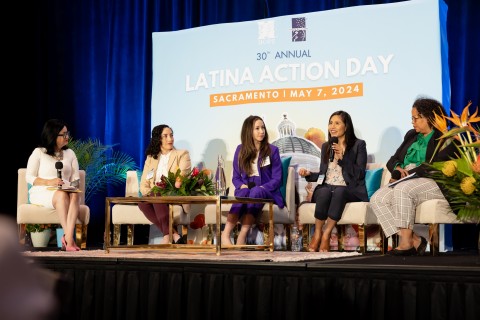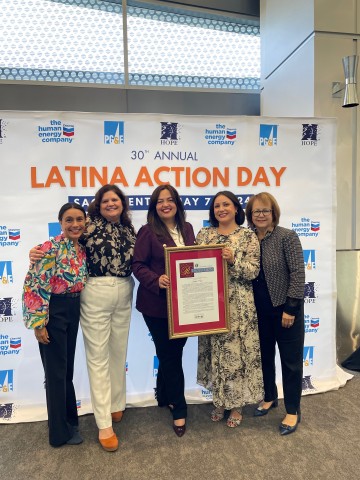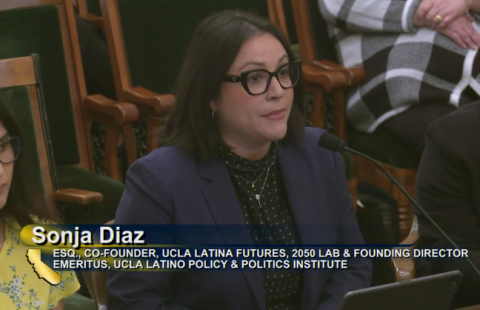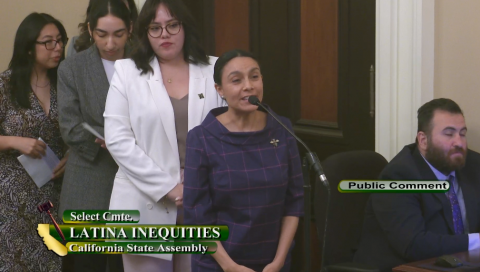Latina Futures Advocates for Pay and Health Equity in Sacramento
In May, the Latina Futures 2050 Lab went to Sacramento to advocate for policy change to close the wage gap and ensure better health outcomes for women of color. As part of that work, on May 7 Latina Futures joined with community partner Hispanas Organized for Political Equity (HOPE) at their 30th Annual Latina Action Day.
Latina Futures expert Youhalli Anaya, an associate professor of family medicine and community health at the University of Wisconsin School of Medicine and Public Health, joined Assemblymember Mia Bonta; Diana Ceballos Robles, maternal-fetal medicine physician and fellow in the National Clinician Scholars Program at UC San Francisco; and Tiffany Mathews, deputy attorney general at the California Department of Justice in a session focused on maternal health and women’s health equity. The panel, moderated by Celinda Vázquez, chief external affairs officer for Planned Parenthood Los Angeles, focused on how to better health outcomes for women of color.

Dr. Youhalli Anaya (second from right) speaks on a maternal health and women's health equity panel at HOPE's Latina Action Day. Photo courtesy of HOPE.
Dr. Anaya grounded the session by sharing her experience helping her parents navigate the healthcare system in a new country and how that pushed her to realize her dream of becoming a bilingual physician. She then outlined the impact culturally competent care has on the community, highlighting studies that have shown when there is no provider that speaks their language or shares their cultural background, patients experience racial bias and that lowers trust in healthcare providers. “Latinos deserve that type of high quality healthcare team that they can confide in, that they can trust and bring their concerns to in their own language,” Dr. Anaya said. She further articulated that one of the most impactful shifts the healthcare system can make is towards shared decision-making—that is, a collaborative conversation between a doctor and patient that creates a clinically effective plan of care that takes into account the cultural values of the patient.
Dr. Anaya also highlighted her research into the Latina physicians shortage, pointing out that Latinas make up only 2.4 percent of the physicians in the United States, yet are thirty-three times more likely to speak Spanish than non-Latino physicians. She went on to highlight the impact of Latina physicians on their patients, resulting in fewer ER visits, fewer hospitalizations and improved healthcare costs. “We need to think about how we grow not only on the individual level with mentorship but also ask, what are the programs supporting Latina medical students?,” she said.
Following a day of panels and advocacy visits to lawmakers at the Capitol, HOPE Latina Action Day concluded with a reception honoring community leaders. Latina Futures co-founder Sonja Diaz received HOPE’s Advocate of the Year award from State Senator Maria Elena Durazo, who praised Diaz’s commitment to creating policy change for all Latinos through her work as founding director of UCLA’s Latino Policy and Politics Institute and her visionary role in creating the Latina Futures 2050 Lab in partnership with the California Latino Legislative Caucus.

The next day, Diaz joined a meeting of the California Assembly Select Committee on Latina Inequities to present research from Latina Futures on the Latina pay gap and the policy change needed to close it. During her testimony, Diaz underscored the unpaid care work that many Latinas execute, including tending to family members in multi-generational households, and spending significantly more time performing care tasks as Latino men. Spotlighting research done by the Latina Futures 2050 Lab, which seeks equity for Latinas by 2050, Diaz pointed out that the Latino workforce in California is large and growing, with more than 3.3 million Latinas making up the state’s young workers, ages 16 to 35. Despite this growing share of the workforce, Latinas’ purchasing power and social mobility is hindered by disparate pay. Latino workers earn the lowest median wages in the state regardless of their educational attainment or work experience. Ending the first panel of the hearing, Diaz called on lawmakers to act. “It’s up to us to work collaboratively based on this evidence to demand and enforce equal opportunities,” Diaz said.

Joined by Helen Torres, CEO of HOPE, and Rita Gallardo Good, commissioner for the California Commission on the Status of Women and Girls (CCSWG), the second panel Diaz spoke on focused on concrete actions the legislature can take to help Latinas achieve economic parity. Diaz outlined three key areas of focus: 1) supporting working-age Latinas to re-enter the workforce after being pushed out during COVID-19, and helping them maintain stable quality employment; 2) providing resources for Latino families; and 3) mandating the flexibility multi-generational households need. She pointed to actions the legislature could take to support these objectives, such as expanding access to paid sick leave and enforcing labor and employment laws to prevent wage theft and gender discrimination.

Veronica Terriquez, Latina Futures 2050 Lab co-founder and UCLA Chicano Studies Research Center director, participated in the hearing during the public comment and expressed the need for lawmakers to think and act boldly. She highlighted research underway at the Lab that is focused on California’s childcare workers, of which Latinas now make up 78 percent. “If we address equity in wages for Latina childcare workers and provide affordable childcare for Latinas and all mothers, we will go a long way in achieving equity,” she said. Terriquez also pointed out the necessity to prioritize policies focused on agricultural workers, specifically around their health and economic stability. She ended with a call to action for lawmakers to work with researchers, and for other professionals to advance the multi-faceted solutions needed to protect workers across the state.
